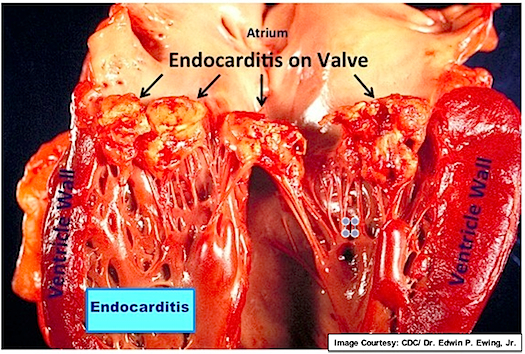DO YOU UNDERSTAND ENDOCARDITIS AND HOW IT MAY AFFECT YOUR DENTAL APPOINTMENT?

Endocarditis is a life-threatening inflammation of the lining and valves of the heart. It is rare and caused by a bacterial infection.
Endocarditis may occur in anyone. More commonly, it presents itself in those who have certain heart conditions and in people who have had endocarditis previously. For those at higher risk, the dentist may recommend a dose of preventive antibiotics be taken one hour before their appointment.
Are you a candidate for preventive antibiotics? Learn what the American Heart Association recommends. The following individuals should take antibiotics before their dental procedures:
- People who have had endocarditis before
- People who have a prosthetic heart valve
- People who have had prosthetic material used in the repair of a heart valve
- People who have had a cardiac transplant
- People who have had cardiac valve disease
- People who have had congenital heart disease.
Your physician and you should converse about your specific condition to determine whether or not preventive antibiotic treatment is necessary prior to your dental visit. And if necessary, a single dose of antibiotic would be taken about one hour prior to certain dental procedures.
Which are the dental procedures that require premedication with a single dose of antibiotics? Let us see!
- Dental procedures that involve the gum tissue or that area located at the tip of the tooth root
- Dental procedures requiring that the inner lining of the mouth be affected, cut, or perforated
The American Heart Association's guidelines do not recommend preventive antibiotics be used for the following dental procedures:
- Local anesthetic administration through uninfected intraoral tissue
- Dental radiographs
- Placement of prosthetic or orthodontic appliances
- Placement or adjustment of orthodontic brackets
- Exfoliation of primary ( baby ) teeth
- Trauma induced bleeding to the inner lining of the lips or mouth
Ultimately, your concerns about whether or not premedication is necessary for you should be addressed with both your physician and dentist.
There are a few important things you should remember to do and converse about when visiting your dentist. Keeping your health record up to date will reduce your risk of infection from dental procedures should you be a high risk individual. Endocarditis can be a life-threatening condition. Taking responsibility for thorough and honest communication will help ensure a safe and pleasant experience. Continue reading to make sure you follow these guidelines:
- Be sure to tell your dentist and his or team about any health changes since your last visit, especially those involving cardiac conditions and surgery or any other medical or surgical procedures completed within the past six months.
- Make sure your dentist is aware of all prescription, over the counter, vitamin, and herbal remedies you may be taking.
- Share your physicians’ contact information with your dentist in case a consultation is needed.
- Practice regular and good oral hygiene and care, brushing twice a day for two minutes each time. Floss regularly.
- Visit your dentist every six months for a periodic oral examination and professional cleaning. Your hygiene appointments may be more frequent ( every three to four months ) should you be diagnosed with periodontal disease.
Your trusted dentist and physician should be available to help guide you through this conversation and process. Do not hesitate to ask questions and make comments about any concerns you may have regarding your health and how it relates to your dental experience.
Remember, we are here to help you achieve a "Smile You'd Be Proud To Wear...ANYWHERE!" in a safe and pleasant environment. Contact us at www.ritadarghamdmd.com to learn more about how this may apply to you.


